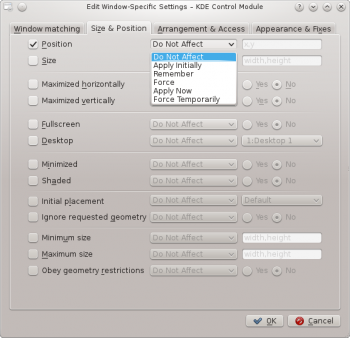KWin Rules Window Attributes/da: Difference between revisions
Appearance
Importing a new version from external source |
Importing a new version from external source |
||
| Line 5: | Line 5: | ||
[[Image:kwin-window-attributes.png|350px|center]] | [[Image:kwin-window-attributes.png|350px|center]] | ||
Egenskaberne, som kan påvirkes er grupperet efter funktion i tre faneblade: | |||
# <menuchoice>Size & Position</menuchoice> | # <menuchoice>Size & Position</menuchoice> | ||
Revision as of 08:25, 9 March 2012
Vinduesegenskaber

Egenskaberne, som kan påvirkes er grupperet efter funktion i tre faneblade:
Each attribute has a set of parameters which determines its disposition.
Parameters
Each attribute, minimally, accepts one of the following parameters. Additional, attribute-specific arguments are listed within each attribute definition.
- Do Not Affect
- Ensure a subsequent rule, which matches the window, does not affect the attribute.
- Apply Initially
- Start the window with the attribute and allow it to be changed at run-time.
- Remember
- Use the attribute setting as defined in the rule and if changed at run-time, save and use the new value instead.
- Force
- The setting cannot be changed at run-time.
- Apply Now, Force Temporarily
- Apply/Force the setting once and unset the attribute.
The difference between the two is at run-time, Apply Now allows the attribute to be changed and Force Temporarily prohibits it to be altered until all affected windows exit.
Attributes
Size & Position
- Position
- Position the window's upper left corner at the specified x,y coordinate.
- Size
- The width and height of the window.
- Maximized horizontally, Maximized vertically, Fullscreen
- These attributes are used to toggle the maximum horizontal/minimum horizontal/full-screen window attribute.
- Desktop
- Place the window on the specified (Virtual) Desktop. Use All Desktops to place the window on all Virtual Desktops.
- Minimized, Shaded
- Toggle the Minimize and Shading window attribute. For example, a window can be started Minimized or if it is started Minimized, it can be forced to not.
- Initial placement
- Override the global window placement strategy with one of the following:
- Default - use the global window placement strategy.
- No Placement - top-left corner.
- Smart - place where no other window exists.
- Maximizing - start the window maximized.
- Cascade - staircase-by-title.
- Centered - center of the desktop.
- Random
- Top-Left Corner
- Under Mouse
- On Main Window - restrict placement of a child window to the boundaries of the parent window.
- Ignore requested geometry
- Toggle whether to accept or ignore the window's requested geometry position. To avoid conflicts between the default placement strategy and the window's request, the placement strategy is ignored when the window's request is accepted.
- Minimum size, Maximum size
- The minimum and maximum size allowed for the window.
- Obey geometry restrictions
- Toggle whether to adhere to the window's requested aspect ratio or base increment.
In order to understand this attribute, some background is required. Briefly, windows must request from the Window Manager, a base increment: the minimum number of height X width pixels per re-size request. Typically, it's 1x1. Other windows though, for example terminal emulators or editors, use fixed-fonts and request their base-increment according to the size of one character.
Arrangement & Access
- Keep above, Keep below
- Toggle whether to keep the window above/below all others.
- Autogroup with identical
- Toggle the grouping (commonly known as tabbing) of windows.
- Autogroup in foreground
- Toggle whether to make the window active when it is added to the Autogroup group.
- Autogroup by ID
- Create a group via a user-defined ID. More than one rule can share the same ID to allow for seemingly unrelated windows to be grouped.
- Tiling
- Override the default window behavior to either Tiled or Floating.
- Skip taskbar
- Toggle whether to display the window in the taskbar.
- Skip pager
- Toggle whether to display the window in pager:

- Skip switcher
- Toggle whether to display the window in the ALT+TAB list.
- Shortcut
- Assign a shortcut to the window. When Edit... is clicked, additional instructions are presented.
Appearance & Fixes
- No titlebar and frame
- Toggle whether to display the titlebar and frame around the window.
- Active/Inactive opacity
- When the window is active/inactive, set its opacity to the percentage specified.
- Moving/resizing
- Deprecated as of >4.8
- Focus stealing prevention
- When a window wants focus, control on a scale (from None to Extreme) whether to honor the request and place above all other windows, or ignore its request (potentially leaving the window behind other windows):
- None - Always grant focus to the window.
- Low
- Normal
- High
- Extreme - The window's focus request is denied. Focus is only granted by explicitly requesting via the mousing.
- Accept focus
- Toggle whether the window accepts keyboard input. Make the window read-only.
- Ignore global shortcuts
- Toggle whether to ignore global shortcuts (as defined by kcmshell4 keys) while the window is active.
- Closeable
- Toggle whether to display the Close button on the title bar.
- Window type
- Change the window to another type and inherit the characteristics of that window:
- Normal Window
- Dialog Window
- Utility Window
- Dock (panel)
- Toolbar
- Torn-Off Menu
- Splash Screen
- Desktop
- Standalone Menubar
- Block compositing
- Toggle whether to disable compositing while the window exists. If compositing is enabled and the rule specifies to disable compositing, while any matching window exists, compositing will be disabled. Compositing is re-enabled when the last matching window terminates.


